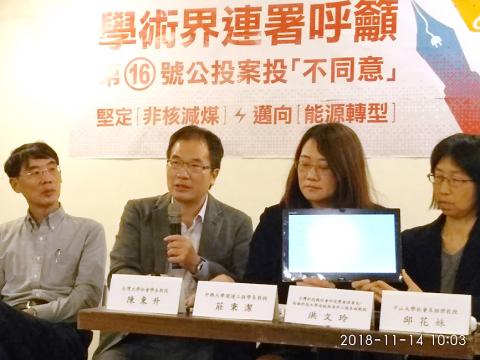A group of academics yesterday urged voters to reject a referendum seeking to overturn the government’s policy to phase out nuclear energy, citing risks of nuclear disasters.
The group, led by Academia Sinica academicians Lin Ming-chang (林明璋), National Chung Hsing University environmental engineering professor Tsuang Ben-jei (莊秉潔), National Taiwan University geoscience professor Chen Wen-shan (陳文山) and several other academics, earlier this month launched a petition advocating their position.
As of yesterday, the petition had collected 559 signatures from academics, the group told a news conference in Taipei.

Photo: Liu Li-jen, Taipei Times
The referendum, one of 10 to be held alongside the nine-in-one elections on Saturday next week, asks voters whether they agree to scrap Article 95, Paragraph 1 of the Electricity Act (電業法), which stipulates that all nuclear power generation facilities must cease operations by 2025.
The article was introduced in January last year as a result of President Tsai Ing-wen (蔡英文) campaign pledge to create a “nuclear-free homeland.”
If the referendum is passed, three nuclear power plants that are scheduled to be decommissioned between the end of this year and 2024 would continue to operate and the Fourth Nuclear Power Plant, which has been mothballed since 2014, could be activated for the first time.
“The referendum pegs its hopes on old nuclear power plants scheduled for decommissioning and the unfinished Fourth Nuclear Power Plant, even though little has changed since 2014: The plants still face risks of earthquakes and tsunamis, and some of them are in the Taipei metropolitan area,” the academics said in a joint statement.
“The government has yet to make plans for the final disposal of nuclear waste, Taiwan Power Co still has a poor safety record and the Fourth Nuclear Power Plant has yet to pass safety tests,” the statement said.
With extreme weather events becoming more frequent, the risk of a nuclear disaster is also increasing, it said, urging the public to vote “no” in the referendum and support clean energy sources as alternatives to nuclear power.
Taiwan is “not ideal for nuclear plants,” considering it has 33 active faults, with some near the three operating nuclear plants and more suspected off the coast near the Fourth Nuclear Power Plant, Chen said.
Nuclear plants would continue causing safety concerns among nearby residents even after they are decommissioned, he said, adding that the three operating nuclear plants could end up being used as warehouses to store spent nuclear fuel if the government fails to solve the problem of nuclear waste disposal.
“If the Fourth Nuclear Power Plant were to experience a nuclear disaster like the Fukushima Dai-ichi nuclear power plant did in 2011, areas within a 20km radius of the plant would have to be permanently evacuated. This would include Taipei, New Taipei City, Keelung, Taoyuan and parts of Hsinchu, affecting a population of 8 million,” Tsuang said, adding: “It is something the nation cannot afford to happen.”

A preclearance service to facilitate entry for people traveling to select airports in Japan would be available from Thursday next week to Feb. 25 at Taiwan Taoyuan International Airport, Taoyuan International Airport Corp (TIAC) said on Tuesday. The service was first made available to Taiwanese travelers throughout the winter vacation of 2024 and during the Lunar New Year holiday. In addition to flights to the Japanese cities of Hakodate, Asahikawa, Akita, Sendai, Niigata, Okayama, Takamatsu, Kumamoto and Kagoshima, the service would be available to travelers to Kobe and Oita. The service can be accessed by passengers of 15 flight routes operated by

MORE FALL: An investigation into one of Xi’s key cronies, part of a broader ‘anti-corruption’ drive, indicates that he might have a deep distrust in the military, an expert said China’s latest military purge underscores systemic risks in its shift from collective leadership to sole rule under Chinese President Xi Jinping (習近平), and could disrupt its chain of command and military capabilities, a national security official said yesterday. If decisionmaking within the Chinese Communist Party has become “irrational” under one-man rule, the Taiwan Strait and the regional situation must be approached with extreme caution, given unforeseen risks, they added. The anonymous official made the remarks as China’s Central Military Commission Vice Chairman Zhang Youxia (張又俠) and Joint Staff Department Chief of Staff Liu Zhenli (劉振立) were reportedly being investigated for suspected “serious

ENHANCING EFFICIENCY: The apron can accommodate 16 airplanes overnight at Taoyuan airport while work on the third runway continues, the transport minister said A new temporary overnight parking apron at Taiwan Taoyuan International Airport is to start operating on Friday next week to boost operational efficiency while the third runway is being constructed, the Ministry of Transportation and Communications said yesterday. The apron — one of the crucial projects in the construction of the third runway — can accommodate 16 aircraft overnight at the nation’s largest international airport, Minister of Transportation and Communications Chen Shih-kai (陳世凱) told reporters while inspecting the new facility yesterday morning. Aside from providing the airport operator with greater flexibility in aircraft parking during the third runway construction,

American climber Alex Honnold is to attempt a free climb of Taipei 101 today at 9am, with traffic closures around the skyscraper. To accommodate the climb attempt and filming, the Taipei Department of Transportation said traffic controls would be enforced around the Taipei 101 area. If weather conditions delay the climb, the restrictions would be pushed back to tomorrow. Traffic controls would be in place today from 7am to 11am around the Taipei 101 area, the department said. Songzhi Road would be fully closed in both directions between Songlian Road and Xinyi Road Sec 5, it said, adding that bidirectional traffic controls would